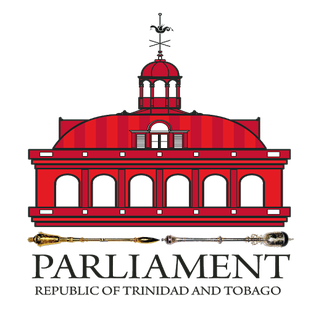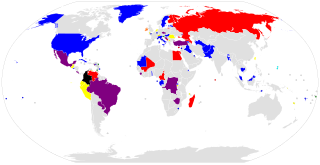
The House of Lords, also known as the House of Peers, is the upper house of the Parliament of the United Kingdom. Membership is by appointment, heredity or official function. Like the House of Commons, it meets in the Palace of Westminster in London, England.
A member of parliament (MP) is the representative in parliament of the people who live in their electoral district. In many countries with bicameral parliaments, this term refers only to members of the lower house since upper house members often have a different title. The terms congressman/congresswoman or deputy are equivalent terms used in other jurisdictions. The term parliamentarian is also sometimes used for members of parliament, but this may also be used to refer to unelected government officials with specific roles in a parliament and other expert advisers on parliamentary procedure such as the Senate Parliamentarian in the United States. The term is also used to the characteristic of performing the duties of a member of a legislature, for example: "The two party leaders often disagreed on issues, but both were excellent parliamentarians and cooperated to get many good things done."
President of the Senate is a title often given to the presiding officer of a senate. It corresponds to the speaker in some other assemblies.

The Parliament of Australia is the legislative branch of the government of Australia. It consists of three elements: the monarch, the Senate and the House of Representatives. The combination of two elected chambers, in which the members of the Senate represent the states and territories while the members of the House represent electoral divisions according to population, is modelled on the United States Congress. Through both chambers, however, there is a fused executive, drawn from the Westminster system.

The Speaker of the House of Representatives is the presiding officer of the House of Representatives, the lower house of the Parliament of Australia. The counterpart in the upper house is the President of the Senate. The office of Speaker was created by section 35 of the Constitution of Australia. The authors of the Constitution intended that the House of Representatives should as nearly as possible be modelled on the House of Commons of the United Kingdom.

The speaker of a deliberative assembly, especially a legislative body, is its presiding officer, or the chair. The title was first used in 1377 in England.

The House of Representatives was the lower chamber of Fiji's Parliament from 1970 to 2006. It was the more powerful of the two chambers; it alone had the power to initiate legislation. The House of Representatives also had much greater jurisdiction over financial bills; the Senate could not amend them, although it might veto them. Except in the case of amendments to the Constitution, over which a veto of the Senate was absolute, the House of Representatives might override a Senatorial veto by passing the same bill a second time, in the parliamentary session immediately following the one in which it was rejected by the Senate, after a minimum period of six months.
Several politico-constitutional arrangements use reserved political positions, especially when endeavoring to ensure the rights of women, minorities or other segments of society, or preserving a political balance of power. These arrangements can distort the democratic principle of one person - one vote in order to address special circumstances.
Chapter 6: The Parliament.Chapter 6 of the Fiji Constitution is titled The Parliament. The five Parts, further subdivided into forty sections making up this chapter, set out the composition, functions, and powers of Fiji's bicameral legislature.

The Parliament of the Democratic Socialist Republic of Sri Lanka is the supreme legislative body of Sri Lanka. It alone possesses legislative supremacy and thereby ultimate power over all other political bodies in the island. It is modeled after the British Parliament.

The Parliament of the Republic of Fiji is the unicameral legislature of the Republic of Fiji. It consists of 55 members elected every 4 years using open list proportional representation in one multi-member nationwide constituency.

The Parliament of Trinidad and Tobago is the legislative branch of the Government of Trinidad and Tobago. The Parliament is bicameral. Besides the President of Trinidad and Tobago, it is composed of the House of Representatives, which is composed of the Speaker of the House of Representatives in addition to 41 directly elected members serving a five-year term in single-seat constituencies, and the Senate which has 31 members appointed by the President: 16 Government Senators appointed on the advice of the Prime Minister, 6 Opposition Senators appointed on the advice of the Leader of the Opposition and 9 Independent Senators appointed by the President to represent other sectors of civil society. It is at present the only parliament in the world with an incumbent female President, President of the Senate, Speaker of the House of Representatives and Leader of the Opposition and made history by appointing the Caribbean's first and only transgender parliamentarian on 15 February 2022. As of 20 April 2021, there are only 24 female members, or 32.9% and eight members born in Tobago or 11.0%.
A member of the Legislative Assembly (MLA) is a representative elected by the voters of a constituency to a legislative assembly. Most often, the term refers to a subnational assembly such as that of a state, province, or territory of a country. Still, in a few instances, it refers to a national legislature.

The Parliament of Egypt is the bicameral legislature of the Arab Republic of Egypt. It is composed of an upper house and a lower house.
An independent or non-partisan politician is a politician not affiliated with any political party or bureaucratic association. There are numerous reasons why someone may stand for office as an independent.
Harish Chandra Sharma is a Fiji Indian politician who became the leader of the National Federation Party in 1987. He was also the leader of the organisation representing most of the Hindus in Fiji, the Shree Sanatan Dharam Pratinidhi Sabha of Fiji.

The Speaker of the Parliament of the Democratic Socialist Republic of Sri Lanka is the presiding officer of the chamber. The current Speaker of the Parliament is Mahinda Yapa Abeywardena, in office since 20 August 2020. The Speaker fulfills a number of important functions in relation to the operation of the House, which is based upon the British Westminster Parliamentary system.

This national electoral calendar for 2018 lists the national/federal elections held in 2018 in all sovereign states and their dependent territories. By-elections are excluded, though national referendums are included.












